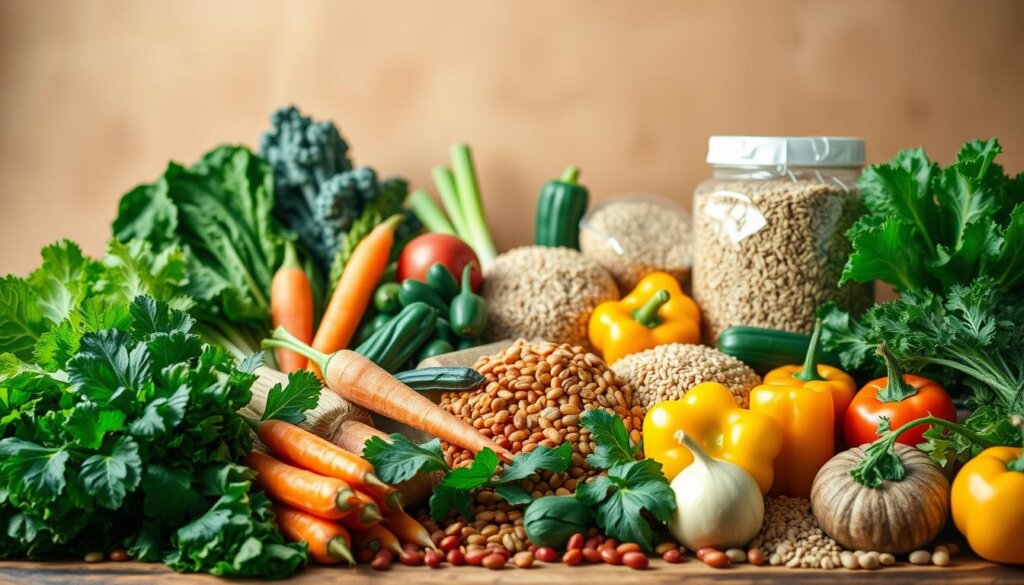Did you know 16% of American adults struggle with irregular bowel movements? This widespread issue impacts daily life, productivity, and overall wellness. While medications exist, natural solutions like fiber-rich foods offer safer, long-term relief.
Nature’s sweetest remedies often hide in plain sight. Certain produce contains unique combinations of soluble fiber, antioxidants, and natural laxatives that gently stimulate digestion. Choosing the right options can transform gut health without harsh side effects.
Not all edible plants work equally. Water content, fiber types, and enzymatic properties vary dramatically. For example, some tropical varieties contain enzymes that break down proteins while others add bulk to stool. Timing and portion sizes also play critical roles.
Key Takeaways
- 16% of adults experience persistent digestive discomfort
- Fiber-rich foods provide natural relief mechanisms
- Specific fruits outperform others due to unique nutrient profiles
- Hydration enhances fiber’s effectiveness
- Dietary adjustments require personalized approaches
This guide analyzes top contenders based on clinical research and nutritional science. Discover how to leverage everyday snacks for smoother digestion and improved energy levels. Let’s explore nature’s pharmacy together.
Understanding Constipation and Its Impact

Click to LEARN MORE
Many individuals face digestive challenges that disrupt their daily routines. While uncomfortable to discuss, recognizing the signs early helps prevent long-term complications. Let’s explore how this common issue develops and why addressing it matters.
Symptoms, Causes, and Daily Effects
Struggling to pass stool more than three times weekly often signals a digestive problem. People might experience straining, hard lumps, or a lingering sensation of blockage. These symptoms can turn simple tasks into exhausting efforts.
Sedentary habits and low water intake frequently contribute to irregularity. Medications like painkillers or antidepressants sometimes slow gut activity. Chronic cases may stem from conditions like irritable bowel syndrome, requiring medical attention.
The Importance of Regular Bowel Movements
Consistent waste removal keeps the body toxin-free. When stool lingers too long, harmful substances may reabsorb into the bloodstream. This buildup can trigger headaches, fatigue, or skin issues alongside digestive discomfort.
Ignoring persistent symptoms risks complications like hemorrhoids or anal tears. Tracking your natural rhythm helps spot deviations early. Simple adjustments often restore balance before severe issues arise.
The Role of Fiber in Digestive Health
Did you know nearly 9 out of 10 people lack enough fiber daily? This silent gap in dietary habits quietly impacts how our bodies process food. Fiber acts like nature’s traffic controller, guiding nutrients while keeping waste moving smoothly through the digestive system.
Insoluble vs. Soluble Fiber Explained
Think of insoluble fiber as your gut’s broom. It sweeps through the intestines unchanged, adding bulk to stool and preventing sluggish digestion. Whole grains and vegetable skins pack this roughage powerhouse.
Soluble fiber works like a sponge. It absorbs water to form a gel that softens stool and slows sugar absorption. Oats and citrus fruits excel here, offering dual benefits for gut health and metabolic balance.
Combining both types creates a winning strategy. Research shows this mix reduces bloating by 40% compared to single-fiber diets. For those curious about how fiber influences digestive enzyme production, the synergy between these fibers optimizes nutrient breakdown.
Start small – sudden spikes in fiber intake can overwhelm your system. Adding an extra serving of beans or berries every few days lets your body adapt comfortably. Your digestive system will thank you with smoother rhythms and less discomfort.
Which fruit is best for constipation?
Three nutritional powerhouses emerge as frontrunners in promoting regularity. Each offers distinct mechanisms to combat sluggish digestion while delivering essential vitamins and minerals. Let’s examine their unique properties and practical applications.
Review of Top Options for Relief
Prunes deliver a triple-action approach. A 40-gram serving packs 3 grams of fiber that bulks up waste material. Their natural sorbitol content draws water into the intestines, creating gentle pressure that stimulates movement.
Apples shine with pectin – a soluble fiber that transforms stool texture. Eating one medium apple with skin provides 4.8 grams of fiber. This compound softens hardened masses while regulating transit time through the colon.
Digestive Mechanisms Explained
Kiwis work through enzymatic action. The actinidin enzyme breaks down proteins while 2.3 grams of fiber per fruit improves consistency. Studies show reduced abdominal discomfort in 45% of regular consumers within two weeks.
| Option | Fiber per Serving | Key Component | Primary Benefit |
|---|---|---|---|
| Prunes | 3g | Sorbitol + Dual Fiber | Stimulates bowel contractions |
| Apples | 4.8g | Pectin | Softens stool texture |
| Kiwis | 2.3g | Actinidin Enzyme | Reduces abdominal strain |

Click to LEARN MORE
Rotating these options prevents digestive adaptation. Try prunes for immediate relief, apples for daily maintenance, and kiwis for comfort-focused support. Pair with water intake to maximize fiber’s stool-softening effects.
Additional Foods for Regular Bowel Movements
Expanding your plate’s color palette does more than please the eye—it fuels digestive harmony. While fruits play a vital role, other foods offer complementary benefits for maintaining regularity. A strategic mix of plant-based options creates a symphony of support for your gut.

Vegetables, Legumes, and Whole Grains That Support Gut Health
Leafy greens like spinach deliver 1.6 grams of fiber per 100-gram serving. Five Brussels sprouts pack 3.5 grams—nearly 14% of daily needs. These vegetables work like nature’s scrub brushes, gently cleansing the digestive tract.
Legumes reign supreme in the fiber kingdom. Navy beans provide 19.1 grams per cup—enough to jumpstart sluggish systems. Lentils offer 7.8 grams per half-cup, perfect for soups and salads. Their soluble fiber forms a soothing gel when mixed with water.
Chia seeds transform liquids into nutrient-packed puddings while delivering 9.8 grams of fiber per ounce. Whole grains like brown rice add crunch and insoluble fiber—the backbone of healthy stool formation. Rotating these foods prevents menu boredom while supporting regular bowel movements.
Pairing these options with adequate water intake maximizes their benefits. The combination softens stool consistency and feeds beneficial gut bacteria. This dynamic approach helps maintain digestive rhythm without harsh interventions.
Lifestyle and Dietary Recommendations for Gut Health
Building lasting digestive wellness requires more than just food choices. Simple daily habits work together to create an environment where your digestive system thrives. Let’s explore how to harmonize nutrition with practical lifestyle adjustments.
Hydration, Exercise, and Natural Supplements
Water acts as fiber’s essential partner. The large intestine absorbs liquid from waste, so adequate daily intake keeps stool soft. Aim for eight glasses minimum, adding more during physical activity or hot days.
Movement jumpstarts sluggish bowels. A 20-minute walk stimulates natural contractions in the gut. Pair this with yoga poses like knees-to-chest to relieve abdominal tension.
Psyllium husk or flaxseed supplements can boost fiber levels. Use them temporarily while transitioning to whole-food sources. Always take with a full glass of water to prevent temporary bloating.
Balancing a Fiber-Rich Diet with Gradual Changes
Increase fiber slowly – add 5 grams every three days. Women should target 25-30 grams daily, men 30-38 grams. Start breakfast with oatmeal, then introduce lentils or berries at lunch.
Sudden spikes in fiber intake overwhelm digestion. Track how your body reacts to new foods. If bloating occurs, reduce portions and drink extra water.
Pair high-fiber meals with hydration breaks. For every 10 grams consumed, drink an additional glass. This balance supports comfortable weight management and regular movement through the digestive tract.
Wellness Group: Service and Support Information
Personalized guidance makes all the difference in digestive wellness. The Wellness Group team recognizes that every individual’s needs vary, especially when addressing digestive concerns through food and lifestyle adjustments.

Contact Details and Business Hours
Reaching out for personalized advice is simple and convenient. Connect via WhatsApp at +60123822655 for direct access to nutrition experts. Our team tailors strategies to help relieve discomfort while aligning with your daily routine.
| Day | Hours |
|---|---|
| Monday-Friday | 9:30 AM – 6:30 PM |
| Saturday-Sunday | 10:00 AM – 5:00 PM |
Weekend availability ensures you get health support when most needed. Whether seeking immediate relief tips or long-term dietary plans, our advisors dedicate time to understand your unique situation.
Over 70% of people report improved digestion within weeks of implementing customized suggestions. The Wellness Group approach focuses on sustainable, food-based solutions that fit seamlessly into your lifestyle.
No concern is too small – message us any time during operating hours. Let’s work together to find the most effective way to restore your digestive comfort naturally.
Conclusion
Managing digestive discomfort becomes simpler when combining smart food choices with daily habits. Dietary fiber from natural sources works synergistically with hydration to support smoother bowel movements. The right balance of soluble and insoluble fibers helps maintain stool consistency while nourishing gut health.
Prunes, apples, and kiwis stand out for their unique abilities to help relieve irregularity. These options soften stool texture through different mechanisms—sorbitol content, pectin action, and enzymatic activity. Pairing them with seeds like chia or flax enhances their effectiveness.
Consistency matters more than quick fixes. Gradually increasing fiber intake prevents bloating while allowing the body to adapt. Drinking water throughout the day keeps the digestive tract lubricated, making elimination more comfortable.
For personalized strategies, the Wellness Group offers tailored advice during extended business hours. Their expertise helps individuals find sustainable solutions that align with local food preferences and lifestyles. Small, intentional changes often yield lasting improvements in digestive wellness.
FAQ
What foods help relieve constipation quickly?
Prunes, apples, kiwis, and berries are excellent choices. They’re rich in soluble fiber and contain natural sugars like sorbitol, which soften stools and stimulate bowel movements. Pairing these with water enhances their effectiveness.
How does soluble fiber improve digestion?
Soluble fiber absorbs water in the digestive tract, forming a gel-like substance that adds bulk to stools. This process eases their passage through the intestines, reducing strain and promoting regularity without causing bloating.
Can drinking water ease constipation symptoms?
Yes! Hydration keeps stools soft and supports muscle contractions in the intestines. Aim for at least eight glasses daily, especially when increasing fiber intake, to prevent stools from becoming hard or difficult to pass.
Are there fruits that worsen bloating or constipation?
Unripe bananas or excessive consumption of high-sugar fruits like grapes may slow digestion. Moderation is key. Opt for ripe, fiber-rich options like pears or papayas, which are gentler on the gut.
Does exercise support regular bowel movements?
Physical activity stimulates the digestive system by encouraging muscle contractions in the intestines. Even light activities like walking for 20–30 minutes daily can improve motility and reduce discomfort.
What services does Wellness Group offer for digestive health?
Wellness Group provides personalized dietary plans, hydration strategies, and natural supplement recommendations. Their team also offers guidance on balancing fiber intake and lifestyle habits to support long-term gut health.






